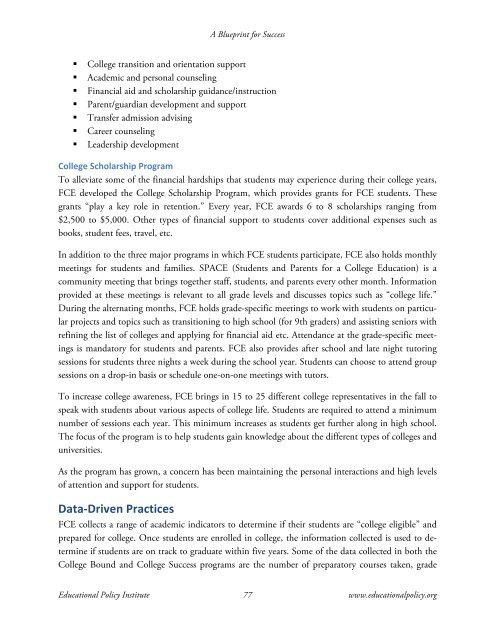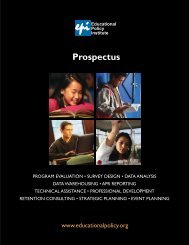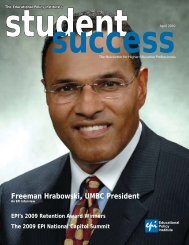A BluePrint for Success: Case Studies of Successful - Educational ...
A BluePrint for Success: Case Studies of Successful - Educational ...
A BluePrint for Success: Case Studies of Successful - Educational ...
Create successful ePaper yourself
Turn your PDF publications into a flip-book with our unique Google optimized e-Paper software.
A Blueprint <strong>for</strong> <strong>Success</strong><br />
College transition and orientation support<br />
Academic and personal counseling<br />
Financial aid and scholarship guidance/instruction<br />
Parent/guardian development and support<br />
Transfer admission advising<br />
Career counseling<br />
Leadership development<br />
College Scholarship Program<br />
To alleviate some <strong>of</strong> the financial hardships that students may experience during their college years,<br />
FCE developed the College Scholarship Program, which provides grants <strong>for</strong> FCE students. These<br />
grants “play a key role in retention.” Every year, FCE awards 6 to 8 scholarships ranging from<br />
$2,500 to $5,000. Other types <strong>of</strong> financial support to students cover additional expenses such as<br />
books, student fees, travel, etc.<br />
In addition to the three major programs in which FCE students participate, FCE also holds monthly<br />
meetings <strong>for</strong> students and families. SPACE (Students and Parents <strong>for</strong> a College Education) is a<br />
community meeting that brings together staff, students, and parents every other month. In<strong>for</strong>mation<br />
provided at these meetings is relevant to all grade levels and discusses topics such as “college life.”<br />
During the alternating months, FCE holds grade-specific meetings to work with students on particular<br />
projects and topics such as transitioning to high school (<strong>for</strong> 9th graders) and assisting seniors with<br />
refining the list <strong>of</strong> colleges and applying <strong>for</strong> financial aid etc. Attendance at the grade-specific meetings<br />
is mandatory <strong>for</strong> students and parents. FCE also provides after school and late night tutoring<br />
sessions <strong>for</strong> students three nights a week during the school year. Students can choose to attend group<br />
sessions on a drop-in basis or schedule one-on-one meetings with tutors.<br />
To increase college awareness, FCE brings in 15 to 25 different college representatives in the fall to<br />
speak with students about various aspects <strong>of</strong> college life. Students are required to attend a minimum<br />
number <strong>of</strong> sessions each year. This minimum increases as students get further along in high school.<br />
The focus <strong>of</strong> the program is to help students gain knowledge about the different types <strong>of</strong> colleges and<br />
universities.<br />
As the program has grown, a concern has been maintaining the personal interactions and high levels<br />
<strong>of</strong> attention and support <strong>for</strong> students.<br />
Data-‐Driven Practices<br />
FCE collects a range <strong>of</strong> academic indicators to determine if their students are “college eligible” and<br />
prepared <strong>for</strong> college. Once students are enrolled in college, the in<strong>for</strong>mation collected is used to determine<br />
if students are on track to graduate within five years. Some <strong>of</strong> the data collected in both the<br />
College Bound and College <strong>Success</strong> programs are the number <strong>of</strong> preparatory courses taken, grade<br />
<strong>Educational</strong> Policy Institute 77 www.educationalpolicy.org




